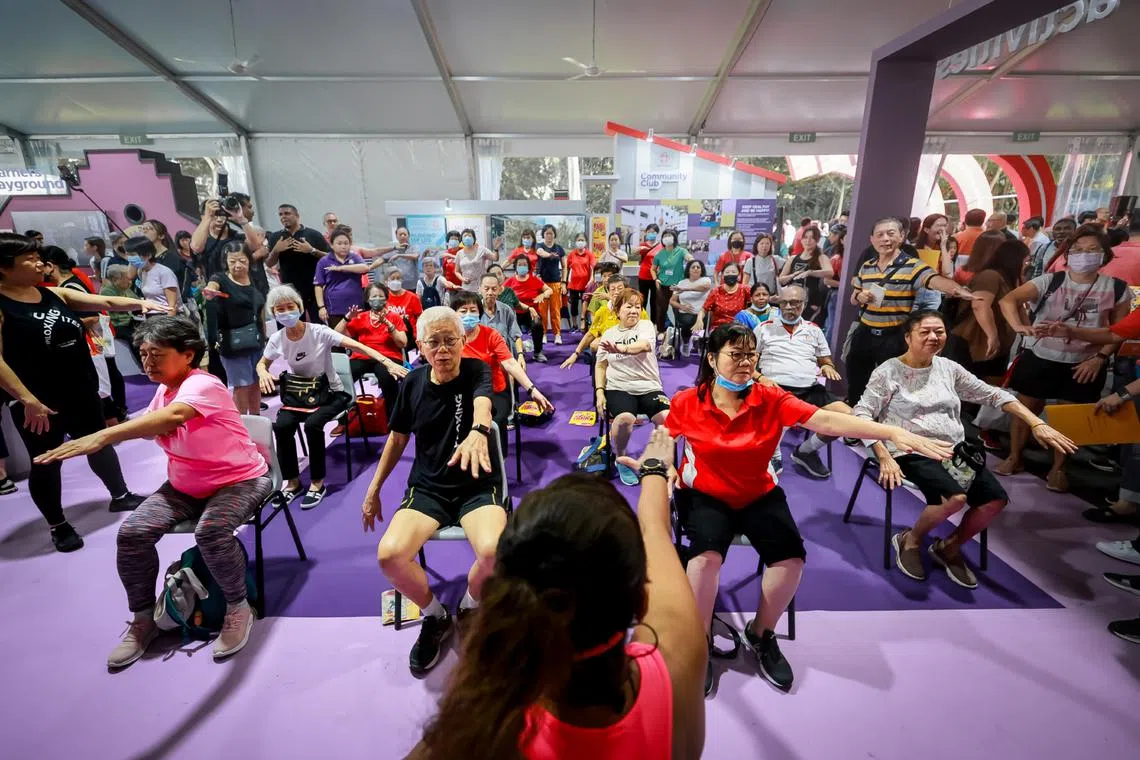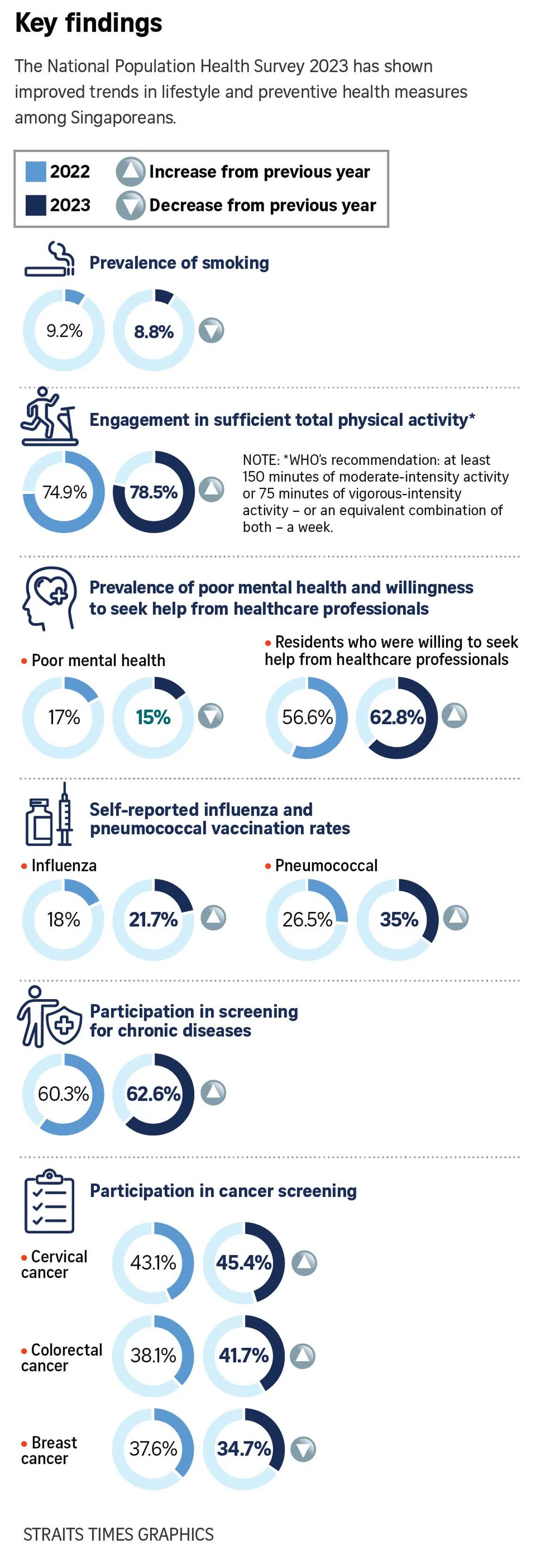More S’poreans exercising, getting their shots; fewer smoking in 2023: National Population Health Survey
Sign up now: Get ST's newsletters delivered to your inbox

The survey tracked the health, risk factors, and lifestyle practices of Singapore residents aged 18 to 74 between July 2022 and June 2023.
ST PHOTO: GAVIN FOO
Follow topic:
SINGAPORE – Singaporeans continued to make healthier choices in 2023.
More people in the Republic got active, put down cigarettes and sought professional help for mental wellness, as well as had themselves screened for chronic diseases and vaccinated against infectious ones.
These findings from the National Population Health Survey 2023 showed that Singaporeans heeded the call of the previous year’s survey for them to pay attention to their own health and to adopt healthy lifestyle habits.
These habits included choosing a healthy diet, engaging in physical activities, managing stress and quitting smoking.
Notwithstanding these positive developments, the national health report card for 2023 found that binge drinking had remained high and that the number of women going for breast cancer screening had fallen.
The survey, conducted by the Ministry of Health, tracked the health, risk factors and lifestyle practices of Singapore residents aged 18 to 74 between July 2022 and June 2023.
More people exercising
Since Covid-19 was declared an endemic disease, the proportion of Singaporeans with “sufficient total physical activity” went up significantly from almost 75 per cent in 2022 to about 79 per cent in 2023.
This followed several years of declining participation, likely primarily due to the pandemic.
Sufficient total physical activity refers to taking part in at least 150 minutes of moderate-intensity physical activity in a week, such as brisk walking, water aerobics or cycling on flat ground; or at least 75 minutes of vigorous-intensity physical activity like jogging, running or swimming laps.
The 2023 survey findings showed the largest contributor to total physical activity a week was commuting (45.6 per cent), followed by leisure-time physical activity (29.1 per cent).
More men (80 per cent) than women (76.9 per cent) were able to meet the recommended total physical activity level, while young adults in the 18 to 29 years age group had the highest level of sufficient total physical activity (85.5 per cent).
Older adults, aged 60 to 74 years, had the lowest proportion at 74.2 per cent.
Decline in smoking numbers
The frequency of daily smoking fell from 9.2 per cent in 2022 to 8.8 per cent in 2023, continuing the downward trend of smoking rates over the last 10 years.
Dr Yvette van der Eijk, an assistant professor at the NUS Saw Swee Hock School of Public Health, said it has nothing to do with smokers moving on to vaping.
“Our own research is showing that, among smokers in Singapore, those who turn to vaping are not more likely to quit smoking, but instead become dual users of both vaping and tobacco products,” she added.
Dr van der Eijk, who leads research to support tobacco policies in Singapore, said: “Studies have repeatedly shown that tax increases are a fast and effective way to reduce tobacco consumption. In Singapore, too, it is clear that the 15 per cent tax increase in February 2023 has motivated people to quit.”
For continued impact, the Singapore Government “should increase taxes by 15 per cent every one or two years”, she added.
The Health Promotion Board said it will continue its multi-pronged efforts to encourage more people to quit smoking.
More than 6,000 smokers joined its national cessation programme called I Quit in 2023.
State of mental health improved
The prevalence of poor mental health decreased – from 17 per cent in 2022 to 15 per cent in 2023.
There was a significant increase in the number of Singaporeans seeking help from healthcare professionals rather than from an informal support network – from 56.6 per cent in 2022 to 62.8 per cent in 2023.
Those looking for help within an informal support network fell from 79.9 per cent in 2022 to 78.4 per cent in 2023.
Fight against infectious diseases
The number of Singaporeans getting themselves vaccinated against influenza and pneumoccocal diseases rose significantly.
Self-reported influenza vaccination went up from 18 per cent in 2022 to 21.7 per cent in 2023, while the take-up rate for pneumoccocal vaccines rose from just 26.5 per cent in 2022 to 35 per cent in 2023.
To further encourage this, citizens who are enrolled in Healthier SG can receive the vaccinations for free at their enrolled clinics, based on the National Adult Immunisation Schedule.
Screening for chronic diseases and cancer
Health screening was found to be more prevalent among older adults aged 70 to 74 years, with two-thirds of them having been screened for diabetes, hypertension and high cholesterol.
Among the ethnic groups, Indians had a higher screening prevalence for the three common chronic diseases at 78.4 per cent, followed by the Chinese (61.4 per cent) and the Malays (52.6 per cent).
Screenings for some cancers had also increased, with that for colorectal cancer up from 38.1 per cent in 2022 to 41.7 per cent in 2023. Colorectal cancer is the second leading cause of death in both men and women in Singapore.
Among women, screening for cervical cancer rose from 43.1 per cent in 2022 to 45.4 per cent in 2023.
However, screening decreased for breast cancer, which has the highest mortality rate in females (17.2 per cent of cancer deaths from 2017 to 2021) – dipping from 37.6 per cent in 2022 to 34.7 per cent in 2023.
No reasons were given for this drop.

Correction note: In an earlier version of the story, we said that for continued impact, the Singapore Government “should increase taxes by 1 per cent every one or two years”. Prof Yvette van der Eijk has since clarified that it should be “should increase taxes by 15 per cent every one or two years”.


